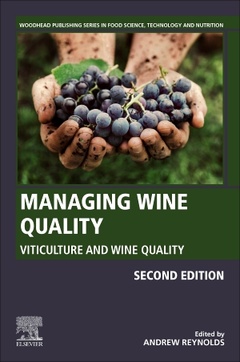Managing Wine Quality (2nd Ed.) Volume 1: Viticulture and Wine Quality Woodhead Publishing Series in Food Science, Technology and Nutrition Series
Coordonnateur : Reynolds Andrew G.

Managing Wine Quality, Volume 1: Viticulture and Wine Quality, Second Edition, reviews our current understanding of wine aroma, color, taste and mouthfeel. In addition, it focuses on the measurement of grape and wine properties, the instrumental analysis of sensory evaluation, and wine authenticity and traceability. The effects of viticulture technologies on grape composition and wine quality attributes are also included, with sections on viticultural and vineyard management practices, fungal contaminants, grape processing equipment, and grape harvesting methods for both red and white wines. In addition, there is coverage on the potential impacts of global warming on wine quality.
With a focus on recent studies, advanced methods, and a look to future technologies, this fully updated edition is an essential reference for anyone involved in viticulture and oenology who wants to explore new methods, understand different approaches, and refine existing practices.
Part 1 Understanding Grape and Wine Sensory Attributes 1. Volatile aroma compounds and wine sensory attributes 2. Wine taste and mouthfeel 3. Wine colour
Part 2 Measuring Grape and Wine Properties 4. Practical methods of measuring grape quality 5. Instrumental analysis of grapes, must and wine 6. Advances in microbiological quality control of wine 7. Sensory analysis of wine 8. Wine authenticity, traceability and safety monitoring
Part 3 Viticulture Technologies, Grape Composition and Wine Quality Attributes 9. Terroir: The effect of the physical environment on vine growth, grape ripening and wine sensory attributes 10. Genetic and genomic approaches to improve grape quality for winemaking 11. Viticultural and vineyard management practices and their effects on grape and wine quality 12. Precision viticulture: Managing vineyard variability for improved quality outcomes 13. Fungal contaminants in the vineyard and wine quality; Controlling ochratoxin A in the vineyard and winery 14. Advances in grape processing equipment 15. Advances in grape harvesting methods 16. Concerns about global warming and its impact on viticulture
Industry
- Professionals within the wine industry (both from a grape farming perspective and a wine making perspective)
- R&D technologists, innovation teams, technicians and product development chemists
Academia
- Researchers and academics in the fields of viticulture and oenology
- Post-graduate students studying viticulture and oenology
- Reviews our current understanding of wine aroma, color, taste and mouthfeel
- Details the measurement of grape and wine properties through instrumental analysis, must and wine, and sensory evaluation
- Examines viticulture and vineyard management practices, fungal contaminants and processing equipment
Date de parution : 11-2021
Ouvrage de 822 p.
15.2x22.8 cm
Thème de Managing Wine Quality :
Mots-clés :
soft drinks; fruit juices; process; method; technique; production; packaging; shelf-life; quality; microbiology; regulatory issues; product claims; health claims



